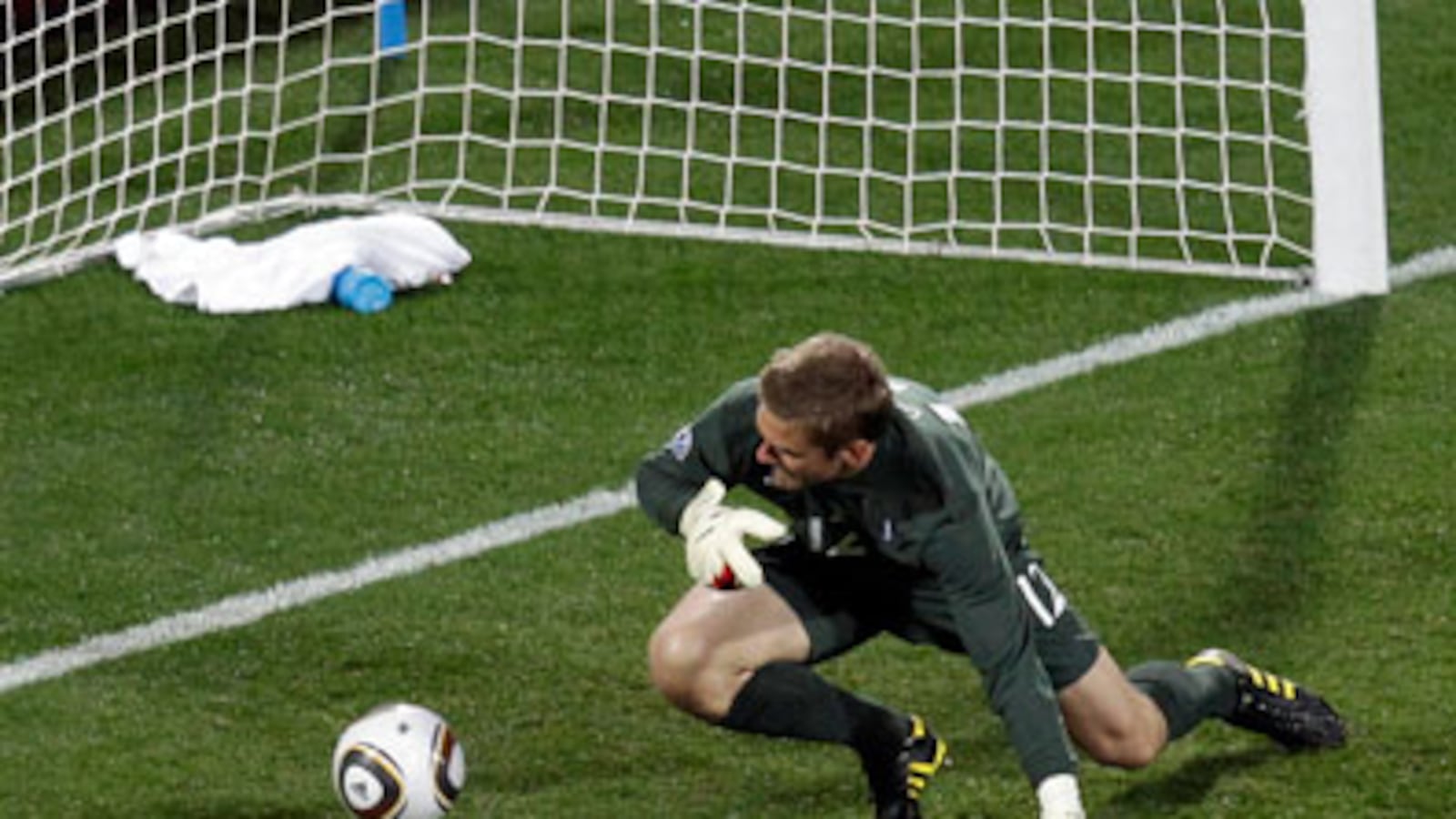The butterfingers goalkeeper has joined the pantheon of the U.K.’s soccer infamous. And nothing short of a World Cup victory, writes Alex Massie, will change that fate.
The goalkeeper is a man apart. He stands alone. "All that I know most surely about morality and obligations," wrote Albert Camus, "I owe to football." Camus was a goalkeeper himself and knew a thing or two about the existential anguish that is the goalie's lot in life and football. As the last line of defense, the goalkeeper is also first in the firing line when blame and retribution are meted out.
Click Image Below to View Our Gallery of U.S. and British Tabloid Covers

Philosophical sympathy may offer little consolation for poor Robert Green now, but the England goaltender, whose epic mishap gifted the United States a draw in Rustenberg on Saturday, has at least guaranteed himself a kind of unfortunate immortality. His name, and his misfortune, will be remembered for years to come.
Whereas outfield players are hardly encouraged to squander goal-scoring opportunities, they are at least forgiven for their profligacy. Not so the hapless goalkeeper of whom perfection is expected all the time and who may find his career defined and remembered by a single calamitous blunder. With the notable exception of penalty shootouts during which the burdens of expectation are reversed, the goalkeeper is expected to be perfect all the time.
This can be an oppressive burden and responsibility. Ask Frank Haffey. The former Scotland keeper is only remembered today for an unfortunate afternoon against England at Wembley in 1961. The Scots did score three times against their old rival; alas England replied by putting nine goals past Haffey, prompting the wry joke: "What's the time? Almost 10 past Haffey." No wonder Haffey emigrated to Australia. Twenty years later, he asked a visiting journalist: "Is it safe to come home yet?" (It wasn't.)
This time, at least England traveled to South Africa accompanied by a greater measure of realism than has been the case at previous tournaments. Delusions of grandeur have been scaled back to more manageable proportions. Victory is for other teams; England merely craves respectability.
The truth of the matter is that England, for all its ballyhooed history, is a minor traditional power. One semifinal appearance since 1966 is a poor return on expectations. And anyway, they don't hand out medals for history.
Even so, coddled by a generous draw, a quarterfinal place seemed an achievable goal. That remains the case, despite Green's error, as neither Slovenia nor Algeria, England's two remaining opponents, possess the firepower to overwhelm England (or the United States, for that matter).
Yet the only way in which Green's mistake can be erased from the national memory is for England to actually defy expectations and win the trophy. Even then one thinks that it might still remain the defining snapshot of the campaign.
• Harold Evans: The Ghosts of England's Soccer Past Green's shocker—the Save Laughed at Around the World—hasn't knocked England out of the tournament. In that respect, it's not comparable to David Seaman's error against Brazil in 2002 or the penalties missed by Stuart Pearce and Chris Waddle in the 1990 semifinal shootout against Germany.
Both Waddle and Pearce were forgiven by the public—as was David Beckham, whose sending off against Argentina in 1998 contributed mightily to England's rehabilitation—but goalkeepers tend to be held to a higher standard.
English goalkeeping has, in any case, been a victim of globalization. None of the top clubs in the English Premier League employ native-born keepers. Instead the best are imported from Holland, Spain, Brazil, and other exotic locales. In this respect, manager Fabio Capello had to make do with short rations on the goalkeeping front. That Green's deputy, David James, is known as "Calamity James" tells you all you need to know about England's nervous goalkeeping.
In other words, something like this was always a possibility. England’s fans knowledgeable enough now not to expect too much from their side have been gripped by anxiety for months. Apart from the irrepressible Wayne Rooney, no part of the side functions as effectively as might be thought ideal. Doubts and holes are everywhere, making England even more susceptible to the twists and turns of fickle fortune.
Good luck deserted England in Rustenberg but as the old cliché points out, good teams make their own luck. By this measurement, you may judge England and find them wanting.
Not that this, or anything else, can provide solace for Robert Green nor prevent his howler from being replayed on television and YouTube for months and years to come. Such is the lot of the scapegoat and the goalkeeper—and the two are often one and the same.
Plus: Our Complete Coverage of World Cup 2010: Photos and Videos.
Alex Massie is a former Washington correspondent for The Scotsman and The Daily Telegraph. He currently writes for The Spectator and blogs at www.spectator.co.uk/alexmassie.





